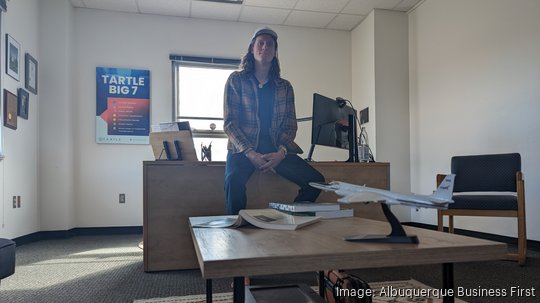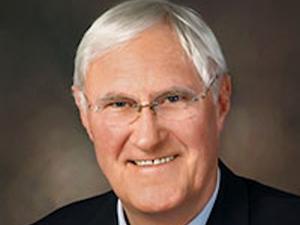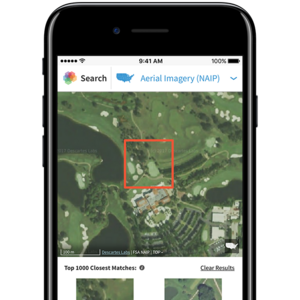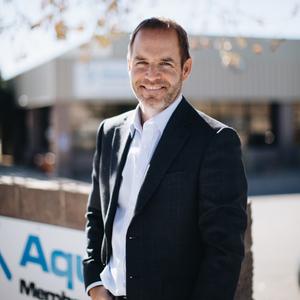
Tucked at the end of a long corridor inside the Santa Fe Business Incubator, past a large conference room and a spate of offices, you can find Alexander McCaig.
Standing well over 6 feet tall with long blonde hair and a lanky build, the former national champion rower, management consultant and startup co-founder doesn't typically wear shoes. And he certainly doesn't wear socks.
That's because, as he told New Mexico Inno, nerve endings throughout a person's body run down through their feet. It's better then, McCaig said, to let your soles connect directly with the ground to regulate body temperature and organ health.
"Most of the things we do in society are totally synthetic, the way they're structured," McCaig said. "So for me to walk around in a non-synthetic shoe and actually feel the Earth, it's more of a mental connection for me. I have to be more conscious of where I'm stepping. It's almost like it forces me to pay more attention to the world that I'm living in."
That more naturalistic conception bleeds into Tartle, the startup McCaig co-founded alongside Jonathan Shelon in 2017. Although it officially launched in 2017, much of the idea behind the startup — which allows customers to provide information about themselves in "data packets," which companies can then pay to access through a secure, privatized platform — started to take shape two years earlier.
Near the time of Tartle's launch came the Cambridge Analytica scandal. Reported in the late 2010s, the scandal saw a whistleblower from Cambridge Analytica, a British political data firm, report the company had used tens of millions of Facebook profiles to run political modeling.
It revealed the extent to which political advertising microtargets individuals based on data pillaged from their user profiles.
It also revealed how little control or power people have over their online data — like age, place of employment or relationship status, for instance — that's used by companies for advertising or other purposes. Tartle's objective, McCaig said, is to give that control back to people, and pay them for it.
The startup's platform acts as a bridge between individuals' data elements, and enterprises ranging from health care firms to financial services companies to artificial intelligence modelers who want more thorough and accurate consumer data. The startup had a patent for its concept of storing, copying, transmitting and receiving value for data approved on Nov. 20, 2023.
McCaig painted a picture of a single individual who chooses to provide various data elements about themselves into Tartle's platform. Those elements are packaged in the aforementioned data packets, which in turn make up "data vaults." On average, he said, people provide around a dozen distinct data elements per data packet.
Each of those elements can then be sold to a company for anywhere from a few cents to about $42, averaging around $20. Tartle has two million users currently, McCaig said.
So there are two million people with around a dozen data points per data packet that companies can then purchase for, on average, $20. The business case, McCaig said, is strong.
But for McCaig, the social case is even stronger. Tartle's mission, per its website, is to "elevate humanity through the sharing of data."
"Technology has grown tremendously fast. But technology has not actually increased human understanding," McCaig said. "So Tartle is on a mission to increase that understanding by allowing essentially humanity to catalog its thoughts, its actions, anything of the sort, and then be able to share that and find understanding among it."
While the majority of Tartle's initial user growth came organically, the startup started seeing promotions through social media in the early 2020s, which gave its user count a more "exponential" growth, McCaig said. Now, the startup — which has a team of eight full-time employees and three contractors — is eyeing strategic partnerships with different brands.
Under those partnerships, brands would pay Tartle to have their own customers access the startup's data sharing platform. The startup's growth would come in large chunks as it formalizes more partnerships, McCaig said; it already has a few such partnerships with a few large health care and financial services companies, he added.
By the end of 2024, McCaig said Tartle is targeting 100 million users.
The biggest challenge in reaching that number is infrastructure, McCaig said. It requires a highly advanced software system to manage tens of millions of data vaults seamlessly. Tartle can get there, he said — it'll just take more backend development.
To that end, McCaig said the startup raised an initial $3.2 million round that ended in 2021 and is nearing another $3.5 million raise on top of that initial round, which he said "has a little bit of capacity left for investors."
And besides acting as chief executive of Tartle, McCaig and Jason Rigby, the startup's chief marketing officer and chief creative officer, host a podcast called "TCAST" which is focused on discussing recent trends in big data, artificial intelligence and humanity, according to its website.
All of McCaig's actions in life — from managing Tartle to hosting TCAST to climbing rocks or meditating — are, he said, aligned with nature.
"The thing that allows nature to exist, allows us to exist," McCaig said. "My goal is to align perfectly with those laws and functions that allow something which is far older than me to exist in its own capacity.
"If I can do that," he added, "that means I've achieved the most relative absolute perfection I could as a human being."









